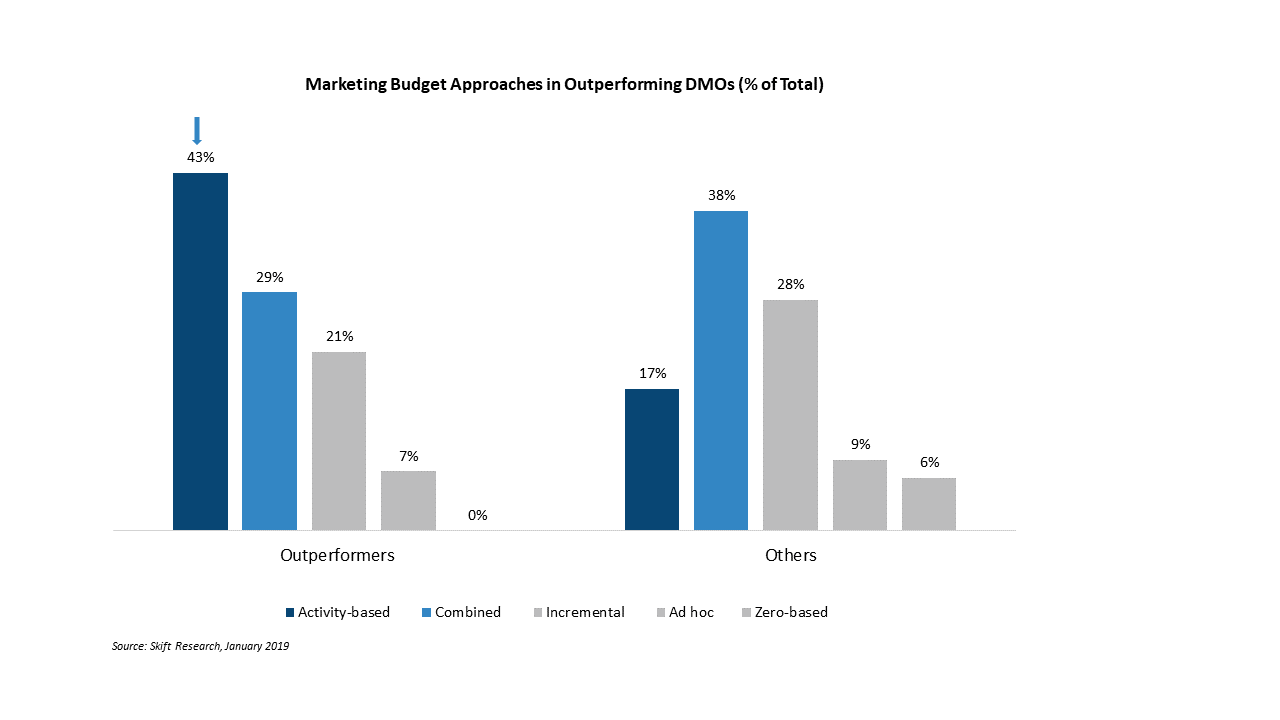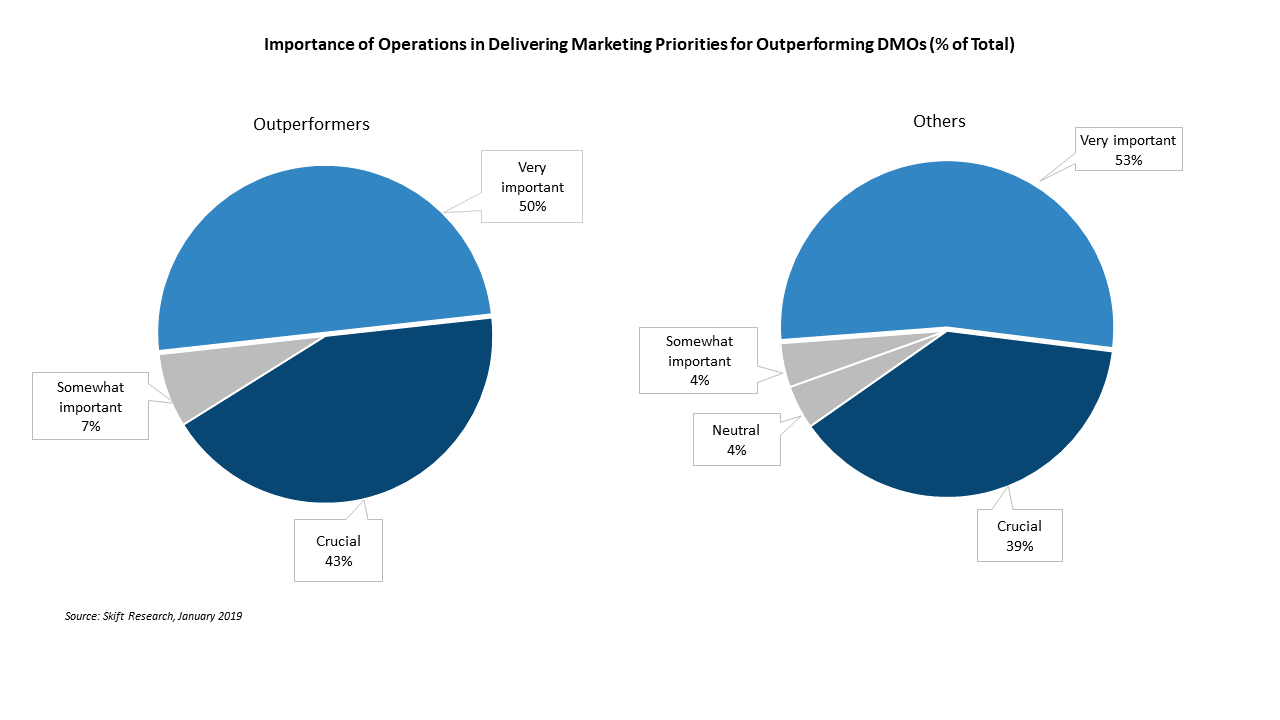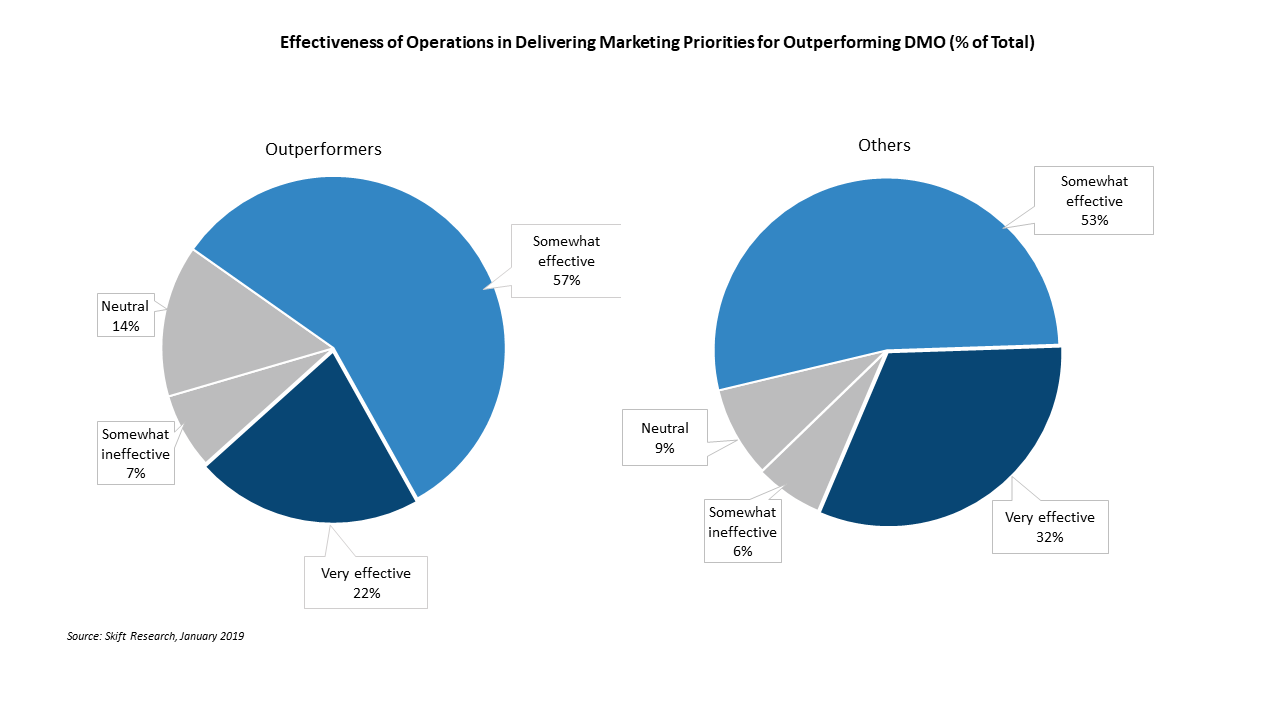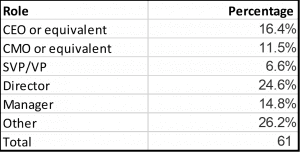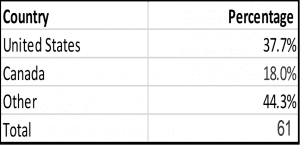Report Overview
Empowered by the explosion of data companies own or have access to about their existing customers as well as prospective customers, travel CMOs and their teams are on a mission to drive and transform business. Yet, more opportunities and promises mean more complexities in technological offerings and skill and function demands. It is within this context that marketing operations has risen as an important discipline in the past few years.
As a result, marketing operations is often tasked to manage channel and campaign processes and performance evaluation, select and manage technology partners, plan budget, and coordinate inter- and cross-team communications. Yet, core questions remain: Should there be a separate marketing operations specialist/team? What are the responsibilities and decision-making powers of the marketing operations function? In addition, there are broader questions that are related to operations and crucial to marketing success, including how marketing teams should be structured, what functions should report under marketing, and how budgets should be set.
To help travel marketing executives see how they stack up in the industry in these areas and set up strategies to optimize, Skift Research conducted a survey of senior executives and marketing professionals in various travel sectors on their practices and attitudes related to these questions. We will release the survey findings in a series of reports, each focusing on one specific sector. Our first report presented findings for hotels (see Marketing Operations in the Travel Industry Benchmarks: Hotels for more details). This report focuses on data for destinations, including destination marketing organizations (DMOs), convention and visitors bureaus (CVBs) and other tourism organizations. To simplify, we use the term destination organizations or DMOs throughout the report to encompass various types of destination organizations.
Total sample size for this sector is 61. Please see the Appendix for more detailed sample demographics
What You'll Learn From This Report
- 2019 marketing priorities for destination organizations
- Prevalence of dedicated marketing operations functions in destination organizations
- Responsibilities and effectiveness of marketing operations functions in destination organizations
- How destination marketing teams are structured and the effectiveness of each structure
- Ideal marketing team structures in delivering marketing success
- Functions that report under marketing in destination organizations
- How destination marketers set up marketing budgets and the effectiveness of each budgeting approach
- How outperforming destination organizations stand out in key marketing operations areas
2019 Marketing Priorities
Most destination marketing leaders have clear mandates on what to deliver for 2019. Raising destination awareness and attracting new tourists are the highest priorities for destination marketers. Interestingly, compared with other sectors, building analytics and ROI measurement capacities are also high on the priority-list for destination marketers, indicating that there is still catch-up to do for this sector.
Designated Marketing Operations Function
A separate marketing operations function has already become an industry standard for destination organizations. Seventy-seven percent of destination organizations surveyed already have a designated marketing operations function, including 57% that have a team rather than one person handling operations.
Destination marketers recognize the importance of having a designated operations function, but size and business nature matter
For the 23% of destination organizations that either disperse operations responsibilities across various teams or don’t have specific operations functions, 50% state it’s necessary to have a designated operations function and 50% have a neutral attitude about having a designated operations function. While this lack of interest could be justified by the small size of some organizations, as marketing gains importance in driving business with sophisticated channels and analytics tools, an efficient operations function or system is crucial for marketing optimization.
Responsibilities of Marketing Operations Function
Marketing operations in the destination sector are taking on a variety of responsibilities to help navigate complex marketing activities and processes. Budget setting and tracking, project management, and cross-functional communications are the top three responsibilities of the operations team. Tech development and platform selection is also selected by 70% of destination marketers as the main responsibility of their operations, a sign that DMOs are investing in tech capabilities.
Marketing operations plays decision-making roles in budget setting and tech development and deployment
As marketing teams get more complex with marketing and advertising channels and tech capabilities, decision making often requires the involvement of many stakeholders and prolonged processes. This can also create ambiguity and tension as to who should make the final decisions. Marketing operations in the destination sector is tasked with crucial roles in these two areas. About 70% of marketing operations in destination organizations have decision power in budget setting and 77% have decision power in tech deployment. Within that, 8% of marketing operations functions are sole decision makers for budget and 10% of them are sole decision makers for tech deployment.
Measuring Success of Marketing Operations
Eighty-three percent of destination marketers surveyed say they measure the success of marketing operations. Congruent with the responsibilities that marketing operations are taking on in cross-functional coordination and budget and tech management, clarity of success measures of other marketing functions and increased efficiency are the most used metrics to measure success. Cost reduction is also a key consideration, indicating the struggle that many DMOs are having with their budgets.
Roles of Marketing Operations in Delivering Marketing Priorities for 2019
There is still work to do for marketing operations in the destination sector to deliver success. While 39% of respondents believe operations is crucial in delivering marketing priorities, only 29% state operations is very effective in executing its outcomes.
Marketing Team Structure
Despite the variation in size and operations approach, destination marketers have relatively straightforward mandates compared with other sectors such as hotels, as driving more visits to the destinations should be the core marketing value. In line with this mandate, over two-thirds of surveyed marketers in the destination sector base team structure on functions. And close to 70% of those who use this structuring approach think it’s effective. In contrast, only 12% organize marketing teams by channel, and another 8% by customer segment. What’s worth noting is that among the 11% of destination marketers who build their marketing team by channel, 86% of them think it’s effective, the highest among all the approaches.
Despite the overall feeling that their current team structure is effective, destination marketers are thinking about alternative
Destination marketers might be taking the customer-centric approach to heart. While only 8% structure their marketing teams by customer segment, 25% select it as the ideal team structure for marketing success. by comparison, while 69% of them organize their marketing teams by function, only 36% believe it’s ideal for marketing success.
Functions That Report Under Marketing
Among all the evolutionary changes in modern marketing, the controversy and lack of so-called industry standards over what functions report under marketing are probably the most prominent. We see this trend across all travel sectors we surveyed. For destination organizations in our survey, in addition to the traditional core capacities of marketing, we see customer insights, e-commerce, customer loyalty, and revenue management reporting under marketing at various rates.
Destination marketers believe more functions should be integrated into the marketing team to deliver best outcomes
Functions with the biggest gaps between reality and desired inclusion are customer loyalty, ecommerce, research and development, and lead generation.
Marketing Budget Approaches
Traditionally, marketing budgets are set once a year by using the previous year’s budget as a base and assigning a percentage increase/decrease as a reflection of revenue growth projection. As marketing gets more dynamic with data and measurement tools, this approach may make it difficult to adjust budgets based on results and thus create inefficiency. Yet 26% of destination marketers are still using this incremental approach in budget setting, while others are adopting more flexible approaches based on activities and regular evaluations. A combined approach, which is characterized by setting budgets once a year but evaluating and adjusting regularly, is adopted by 36% of destination marketers surveyed. Among those who adopt a combined approach, 74% think it’s effective.
Destination marketers believe budgeting approaches that are based on clear goals and allow for regular evaluations and adjustments are crucial for delivering marketing success
When asked the ideal budget approaches for marketing success, there is big convergence on activity-based and combined approaches, with 78% believing either is important for achieving marketing goals.
Functions That Head of Marketing Reports To
The central role that marketing plays in destination organizations’ businesses is clear. For nearly three-quarters of the organizations surveyed, the head of the marketing team reports directly to the CEO.
Highlights of Outperforming Destination Organizations
In the survey, we asked the respondents to report their companies’ financial performance. While financial performance has different meaning for the destination sector from other travel sectors, as most of the destination organizations are not-for-profit and thus revenue often means fundings (public or private), financial performance is a viable metric to measure their success and accrue future funding. Out of the 61 DMOs surveyed, 14 say their companies are more profitable than their competitors, 43 say their profitability is about average in the hotel industry and another 4 say they are less profitable than their competitors. We’ve found that the organizations that are more profitable (outperformers) do stand out in the key areas we’ve discussed above.
They are more likely to have established a separate marketing operations team.
Their marketing operations functions are more likely to take on project management, tech deployment, and employee training responsibilities.
Their marketing operations functions are more likely to share decision making with other teams in budget setting and tech decisions.
Yet, they are less likely to have set up metrics to track operations success.
They are more likely to use increased efficiency and cost reduction as operations success metrics.
They are more likely to structure marketing teams by team function.
Their team structure is more effective.
They have fewer functions reporting under marketing.
They are more likely to adopt activity-based budget approaches.
Their budgeting approach works.
Their head of marketing is more likely to report to the CEO.
Their marketing teams are focusing more on customer acquisition, building data and analytics capacity, and revenue generation.
They are more likely to recognize the crucial role of marketing operations in marketing success.
Yet, they are more critical of their marketing operations in effectively delivering marketing priorities.
Appendix: Destination Sector Survey Respondent Demographics























